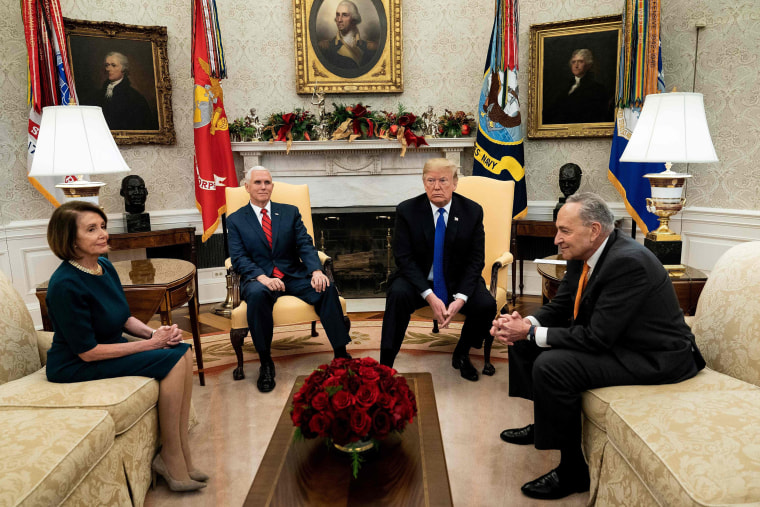By any fair measure, last week's Capitol Hill negotiations over an economic aid package did not go well. When the White House imposed a Friday deadline, it was easy to imagine a normal political dynamic in which a president, eager to get something done, brought the principal players together in the hopes of working something out.
Donald Trump, however, left town, heading to one of the private golf clubs he owns and profits from. Asked about his hands-off approach, the president told reporters last night, "I've been involved personally, and, uh, you know, through my representatives, who are wonderful."
There is, however, a key distinction between a president being "involved personally" and delegating the negotiations to "representatives." Trump, whether he understands this or not, has been forced to adopt the latter approach.
The Washington Post highlighted the familiarity of these circumstances.
The president who pitched himself to voters as the consummate negotiator and ultimate dealmaker has repeatedly found his strategies flummoxed by the complexities and pressures of Washington lawmaking.
The Daily Beast had a related report over the weekend, noting how remarkable it is to see the president "checked out of talks." Just as importantly, no one seems eager to see Trump at the negotiating table.
Would it be helpful for him to be more involved, The Daily Beast asked one top Senate GOP aide. "No," the aide replied, without skipping a beat. "No."
As I noted in my book, there have been multiple instances throughout the last few years in which GOP officials rejected the idea of having the president sit down with Democratic leaders for talks for an unfortunate reason: Republicans assumed that officials like Nancy Pelosi and Chuck Schumer would exploit Trump's ignorance and end up with deals the GOP wouldn't tolerate.
Evidently, these aid talks are another example of the president being unwilling and unable to step up.
It's easy to forget, but this is the opposite of what American voters were promised four years ago. As regular readers may recall, in January 2016, then-candidate Trump told Fox News, "[T]he problem with Washington, they don't make deals. It's all gridlock. And then you have a president that signs executive orders because he can't get anything done. I'll get everybody together."
In November 2015, in reference to Barack Obama, Trump added, "He doesn't work the system. That is why he signs executive orders all the time because he can't get his own people to go along." A month earlier, Trump said, "Look at Obama. He doesn't get anything done.... You've got to close the door and get things done without signing your executive orders all the time. That's the easy way out."
This posture continued throughout his candidacy. As recently as late September 2016, Trump complained, "Right now, we have an executive-order president. He just keeps signing."
In March 2016, with his hold on the GOP nomination nearly complete, Trump went so far as to declare, "I want to not use too many executive orders, folks. Executive orders sort of came about more recently. Nobody ever heard of an executive order. Then all of a sudden Obama, because he couldn't get anybody to agree with him, he starts signing them like they're butter. So I want to do away with executive orders for the most part."
Perhaps the best line of them all was delivered in January 2016, when Trump told CNN his thoughts on the "executive-order concept." The future president explained at the time, "You know, it's supposed to be negotiated. You're supposed to cajole, get people in a room, you have Republicans, Democrats, you're supposed to get together and pass a law. [Obama] doesn't want to do that because it's too much work. So he doesn't want to work too hard. He wants to go back and play golf."
Four years later, on issue after issue, Trump seeks some kind of policy change, runs into resistance, finds himself wholly incapable of governing or negotiating, and quickly scrambles to safe ground: executive actions that give the appearance of progress while achieving very little.
The one thing Trump told voters he knew how to do -- get people in a room and strike big deals -- is the one thing he no longer even tries to do.
As we discussed last month, none of this is the result of misfortune or near-miss opportunities. Trump has struggled at deal-making because he doesn't care to do the work necessary to reach agreements. To achieve policy breakthroughs, negotiators need to do their homework. They need to be able to listen to competing arguments. They need to be creative. They need to be consistent and show follow-through. They need patience and an appreciation for nuance.
Whatever strengths Donald J. Trump may bring to the table, he has none of these qualities.
Why doesn't the president get directly involved in negotiating deals? The answer is an awkward one for the White House: Trump doesn't know how.
Postscript: In a tweet this morning, the president suggested his executive actions have helped pave the way for talks. "So now Schumer and Pelosi want to meet to make a deal," he wrote. "Amazing how it all works, isn't it. Where have they been for the last 4 weeks? ... They know my phone number!"
In reality, Democrats passed an economic aid package more than 12 weeks ago, waited for the GOP to initiate talks, and marveled as Republican leaders dithered for months. "Where have they been"? Democratic leaders have been at the negotiating table, wondering where Trump and his plan have been hiding.
